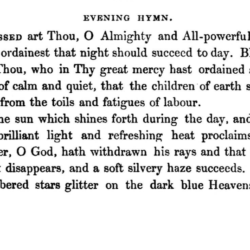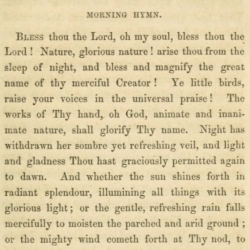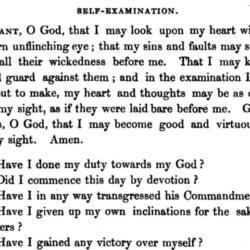TOGGLE COLUMNS (on/off):ADJUST COLUMN POSITIONS: select the column header cell and drag it where you want. show me!COPY INDIVIDUAL COLUMN(S): use CopyTables, a browser extension.
| Contribute a translation | Source (English) |
|---|---|
Morning hymn. | |
Blessed art Thou, oh gracious and ever blessed God, who hast ordained another day should dawn for me. Blessed art Thou, who, in Thy great mercy, hast permitted me to wake in health and strength from the terrors of the dark and silent night. | |
Thy shield was around me; Thy arm sustained me; even in sleep Thou wilt not forsake me. Thou withdrawest not Thy arm from me lest I sleep in death. Thou hast recalled my flitting soul, and I wake and think, and rise and move, and my soul would praise Thee, oh my God, but it hath no words adequate to speak those glorious praises! | |
The sun, when it shines forth in its splendour, deluging all things with its flood of brilliant light, proclaims Thy Majesty, oh Lord! | |
The rain, the wind, speak of Thy unchanging mercy, Thy constant love for man. | |
The little birds have raised their early carol, and their voices sing to the glory of their beneficent Maker: but I know not how to utter forth Thy praises, oh our Father! my lips are mute. | |
I look forth on all speaking nature, and my heart proclaims Thy glory, and my soul is filled with gratitude and love. | |
Oh, my Father, accept the thanksgiving of my heart, for how can I praise Thee, oh Lord, according to Thy works; how can I speak my thanks for Thy never-ceasing goodness? | |
Oh teach me to walk in Thy ways, oh my God, that I may come near Thy footstool. Oh lead me in the paths of righteousness, that my soul may utter forth Thy praises, that my lips may speak my gratitude and love. | |
Oh Thou art my God; Thou art my God, and I will praise Thee, and exalt Thee for ever, with my whole soul, and my whole heart; and I will give thanks unto Thee, oh God, for Thy mercy endureth for ever. | |
Thou hast given me blessings I deserve not. Thou hast given me mercies of which I am unworthy. Far above many of my fellow creatures hast Thou blessed me. | |
Oh let me still feel how unworthy I am of such goodness, and each morning bless and glorify Thy Name. | |
Blessed art Thou, oh Lord my God, now and for ever. | |
Hallelujah! Praise ye the Lord! |
“Morning hymn (Blessed art Thou)” [version 1] by Grace Aguilar was published posthumously by her mother Sarah Aguilar in Essays and Miscellanies (1853), in the section “Sacred Communings,” pp. 224-225. In the UK edition of Sacred Communings (1853) the prayer appears with small variations of spelling and punctuation on pages 136-138. Another variation of this prayer ([version 2] can also be found on pages 92-93 of the UK edition.
Source(s)



“Morning Hymn (Blessed art Thou) [version 1], by Grace Aguilar (ca. 1830s)” is shared through the Open Siddur Project with a Creative Commons Public Domain Dedication 1.0 Universal license.
![morning hymn (Blessed art Thou) [version 2] (Grace Aguilar 1853) - cropped](https://opensiddur.org/wp-content/uploads/2023/05/morning-hymn-Blessed-art-Thou-version-2-Grace-Aguilar-1853-cropped-250x250.png)


![morning hymn (father of all) [in illness] (Grace Aguilar 1853) - cropped](https://opensiddur.org/wp-content/uploads/2023/05/morning-hymn-father-of-all-in-illness-Grace-Aguilar-1853-cropped-250x250.png)


![Prayer (Oh, Father, merciful Father) [version 2] / Dedication and Surrender, by Grace Aguilar (ca. 1830s)](https://opensiddur.org/wp-content/uploads/2023/05/dedication-and-surrender-Grace-Aguilar-1853-cropped-250x250.png)



Comments, Corrections, and Queries